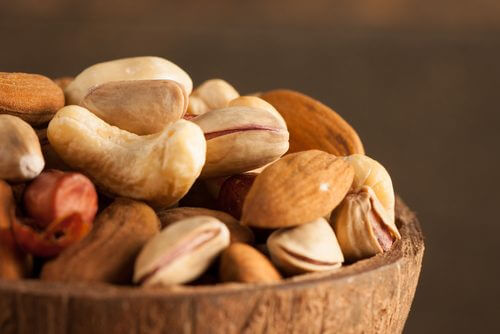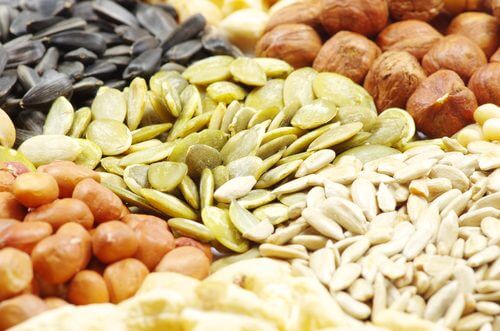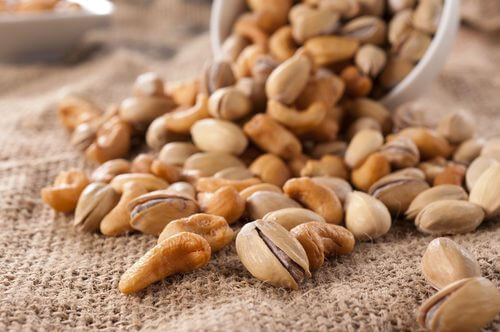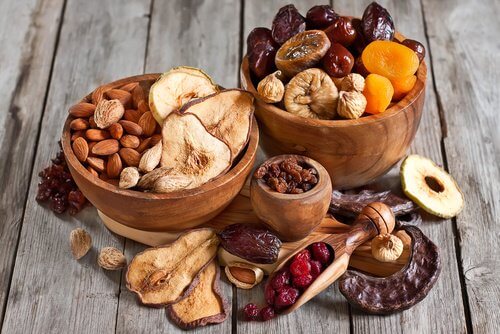Nuts and Seeds: Why Should We Soak Them?


Reviewed and approved by Doctor Carlos Fabián Avila
Nuts and seeds are an important part of eating healthy thanks to their excellent, complete nutritional profile.
They’re also good to eat anytime you have cravings, since they’re very satisfying.
In this article, discover their fantastic properties as well as why you should soak them before eating them.
Why nuts and seeds are good for you
Nuts and seeds are an important part of the food pyramid. They pack an energy punch that provides a lot of nutrition in just a small serving.
Actually, just a handful a day will help you avoid certain vitamin and mineral deficiencies.
They’re also high in vegetable proteins, a great way to lower your consumption of animal protein without any risks to your health. That’s why they are so recommended for kids and athletes, while everyone should have them in moderation.
In addition, they contain a good amount of healthy fats which are essential for keeping a balanced weight.
Plus, they’re are high in fiber, something that helps regulate intestinal function and naturally prevent constipation.
“Check this out, too: The 6 Nutritional Deficiencies That Can Cause Depression”
Which ones should I pick?

You have a wide variety to pick from depending on what kind of taste you want or what you need for your health. Let’s take a look at some of the many varieties and their benefits.
Nuts:
- Walnuts: Excellent at improving brain function.
- Hazelnuts: These regulate your blood sugar levels and encourage intestinal movement.
- Almonds: They help with breastfeeding and contain a lot of vitamin E and calcium.
- Macadamia nuts: Have a high healthy fat content.
- Brazil nuts: Are a natural source of selenium.
- Pistachio nuts: Are very rich in iron and great at fighting anemia.
- Pine nuts: These stand out for their high levels of vitamin B1.
- Cashews: Have high amounts of magnesium, perfect for your muscles and nerves.
Seeds
- Sunflower seeds: Are rich in vitamin B1, vitamin E, magnesium, iron, phosphorus, and calcium.
- Pumpkin seeds: Are one of the best ways to prevent intestinal parasites and prostate issues.
- Sesame seeds: Are the best vegetable source of calcium, which is essential if you don’t consume dairy.
- Linseeds: Are high in essential fatty acids, which improve the appearance of your skin, hair, and nails.
- Chia seeds: Encourage intestinal movement and lower your cholesterol.
Soaking is essential

Raw nuts and seeds, as well as legumes, are covered with a substance called an enzyme inhibitor.
Enzyme inhibitors have the job of preventing premature germination and help conserve the nutrients so the plant can grow. However, when you eat them, they impede the absorption of certain minerals and proteins and make digestion more difficult.
If you soak them for a few hours, you’ll avoid this problem and you’ll be activating the seed for consumption or sprouting.
Each nut or seed has its own approximate soaking time:
- Almonds: 12 hours
- Chia and linseed: 2 hours
- Walnuts and hazelnuts: 8 hours
- Pumpkin and sesame seeds: 6 hours
- Sunflower seeds: 4 hours
- Pine nuts, pistachios, cashews, Brazil nuts, and macadamia nuts: not necessary to soak
After activating them, you can toast them on low heat if you want to enhance their flavor.
We should point out that linseed and chia seeds create mucilage when soaked, which is very good for getting your intestines moving. You can process or blend them with the soaking water.
How to add them to your diet

While nuts and seeds can be eaten at any time of the day, here are some unique ideas to get them into your diet every day:
- With your cereal for breakfast
- Homemade hazelnut cocoa spread, sweetened with honey
- In smoothies, with fruits and oats
- Toasted, ground nuts or seeds in sauces or dressings
- In cookie or cake dough, ground well like a flour (but much more nutritious!)
- To make homemade vegetable drinks and smoothies
- With desserts, like baked apples with walnuts or pieces of orange with honey and almonds
- Toasted, ground sesame seeds with salt, known as gomasio, is a delicious condiment for rice and pasta
All cited sources were thoroughly reviewed by our team to ensure their quality, reliability, currency, and validity. The bibliography of this article was considered reliable and of academic or scientific accuracy.
-
Ros, E. (2010). Health benefits of nut consumption. Nutrients. https://doi.org/10.3390/nu2070652
-
Preedy, V. V., Ross Watson, R., & Vinood, P. (2011). Nuts and Seeds in Health and Disease Prevention. Nuts and Seeds in Health and Disease Prevention. https://doi.org/10.1016/C2009-0-01960-6
-
Yang, J., Liu, R. H., & Halim, L. (2009). Antioxidant and antiproliferative activities of common edible nut seeds. LWT – Food Science and Technology. https://doi.org/10.1016/j.lwt.2008.07.007
This text is provided for informational purposes only and does not replace consultation with a professional. If in doubt, consult your specialist.








